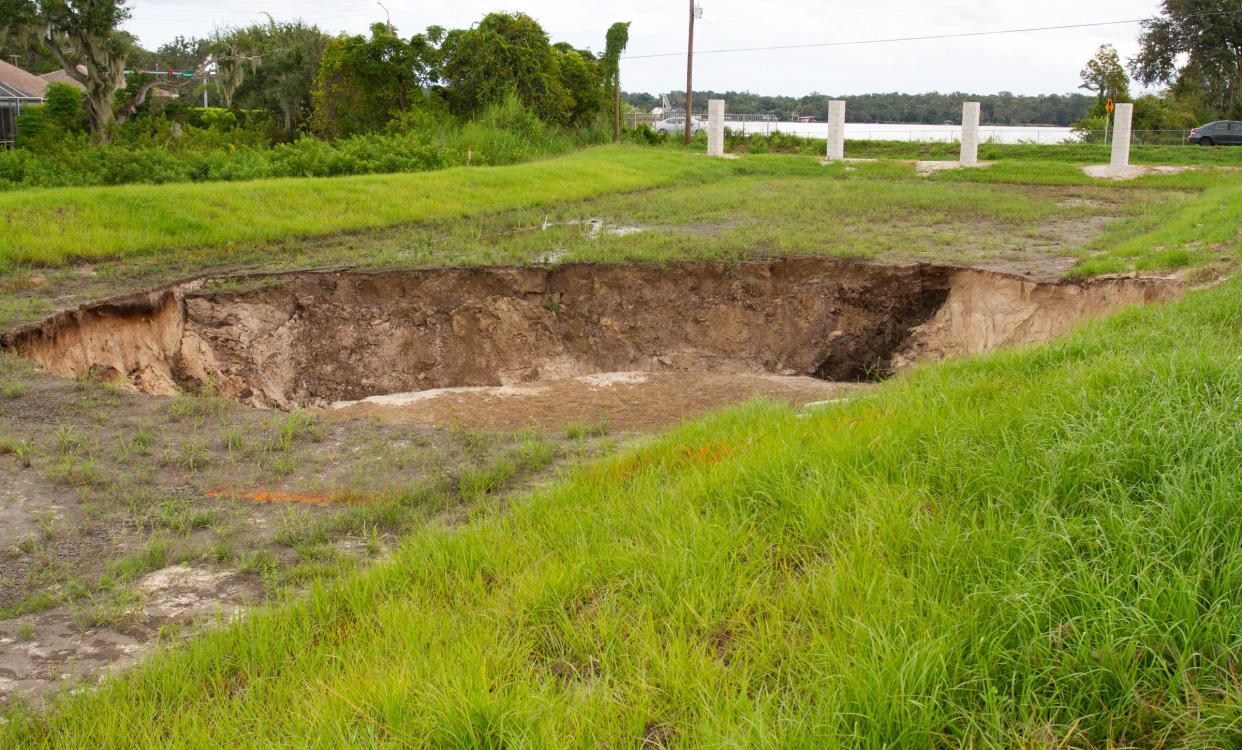Lakeland sinkhole off Scott Lake Road 'active but stable," difficult to predict future

LAKELAND — A sinkhole just west of Scott Lake Road in Lakeland is "active but stable" as of Monday afternoon, according to Polk County officials.
A substantial depression formed west of Scott Lake Road south of Fitzgerald on Friday afternoon is being monitored by Polk County, spokesman Jeff Foley said. It measured to be roughly 75 feet wide by 25 feet deep Friday afternoon and no updated measurements are available.
It is the second sinkhole to open up within three months on property owned by Acres at Scott Lake LLC and Lakeland residents Debra and Joseph Kedzuf, according to SunBiz.org. Both holes have appeared in what's marked as a future retention pond in site plans on file with the county.
It's unclear whether the second sinkhole will trigger officials to re-evaluate the developer's plans and permit for a retention pond.
The Southwest Florida Water Management District was notified of the sinkhole Friday afternoon and has personnel on site to assess the site and assess the impacts, spokesperson Susanna Martinez Tarokh wrote in an emailed statement.
"The District’s role is to assess how the sinkhole is affecting the nearby stormwater pond and to determine if corrective action is needed for the stormwater pond," she wrote. "Our staff indicated that the property owner was on site and had planned to start backfilling the sinkhole over the weekend, if the sinkhole activity had stabilized."
The state's compliance regulation staff did not have any updates on Monday, according to Tarokh, other than the water levels in the lake have remained stable since the Aug. 21 heavy rain event.
Can sinkholes be predicted?
Ted Smith, principal geologist with Lakeland-based Earth and Fire Resources LLC, said it's difficult if not impossible with current technology to predict if and when further sinkhole activity in a specific area might occur.
"Predicting sinkhole probability is really tenuous at best," he said. "Mathematically, for the region of that part of Lakeland, it’s probably higher than average. But you can’t make a reasonable assumption on a piece of property without doing direct testing."
Smith, a geologist investigating sinkholes for more than 25 years, said he had the opportunity to examine and study Scott Lake when the 285-lake abruptly drained in June 2006. A massive sinkhole had formed, lowering the water level by 12 to 13 feet, killing an estimated 32 tons of aquatic wildlife that got swallowed up, according to state officials' reports.
Child pornography possession Former Lakeland High teacher sentenced to 35 years
An examination of the lakebed showed a combination of several different sinkhole features over the years.
"The lake's not one big sinkhole," Smith said. "Scott Lake and many other lakes are an agglomeration of sinkholes over hundreds of millions of years."
Owners of lakefront property could elect to have a ground penetrating radar study performed to determine whether there are underground structures that could pose an issue, Smith said. A radar signal is transmitted into the ground penetrating 20 to 30 feet depending on soil. The study identifies anything below the ground, like an open space or cavity, that could pose an immediate threat to turn into a sinkhole.
"Things in the 25 to 300 foot range, well you can't really see that well," he said. The "ultimate way" to test for potential sinkholes is to conduct test drillings on a potential site, Smith said. He estimated the cost between $10,000 and $15,000. Drilling is typically only done by insurance companies where a property owner has filed a claim for damages.
Property owners with homeowners insurance should know most policies cover catastrophic sinkhole damage, Smith said. It often, however, does not cover damage that occurs slowly over time ― cracking of foundations or walls — that don't imperil the structure's stability.
Scott Lake used to be orange groves, Smith said, which is important to note as wells were drilled. The area's limestone is highly permeable, allowing large quantities of water to be pumped up for irrigation. Over time, Smith said this may have worn away at the limestone, creating large cavernous holes, which if destabilized, say by drilling during construction, could open up and allow upper levels of dirt and sand to crumble into the hole.
Two sinkholes in the area of a proposed retention pond may raise concern, Smith said, as stormwater will likely drain into a filled sinkhole feature faster and go directly into the aquifer. Smith said there are measures that could be taken, like a liner, to help previous issues. But it would increase the cost of the developer's project.
Sara-Megan Walsh can be reached at swalsh@theledger.com or 863-802-7545. Follow on X @SaraWalshFl.
This article originally appeared on The Ledger: Sinkhole off Scott Lake Road 'active but stable,' Polk officials say

